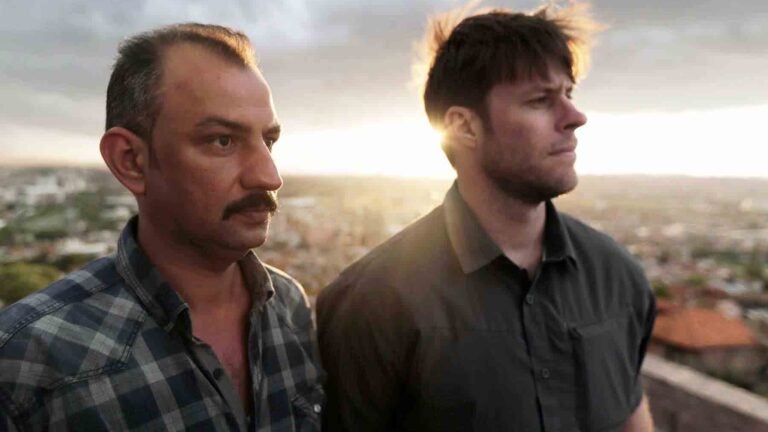
The Captain and Chase Millsap stand together in Turkey, where the Captain waits for updates on his refugee application status. (Photo/Spencer Millsap/National Geographic)
Brothers in arms: An American veteran and the Iraqi who saved his life
A former U.S. infantry commander thought a few phone calls would rescue his friend. Instead, he found a series of obstacles steeped in outdated policy
https://youtu.be/BKZ3fwXIK7o
A thought runs through the mind of Chase Millsap MPP ’16 on every Veterans Day: “We made it. We’re still here and we’re together.”
The former Marine infantry commander and Green Beret always spends the day with veterans from the local community and buddies from his 15 years in uniform.
“Our military service binds us together. For me, it’s a day to really reflect on that,” said the Texas native and Naval Academy graduate who is now a policy analyst and community liaison with the USC-based Los Angeles Veterans Collaborative.
Worlds apart
But Millsap can’t spend Veterans Day with the one comrade he most wants to see — the Iraqi officer who saved his life back in 2006.
Ten years ago, “the Captain” — he calls him that to protect his identity — had pushed Millsap to the ground and run straight into sniper fire at their dusty checkpoint outside Ar-Rutbah in the Al Anbar province. The two officers worked together again in 2007, training 700 Iraqi soldiers near the Syrian border as part of Gen. David Petraeus’ counterinsurgency strategy.
This is a man I trusted every single day when the world seemed to be crashing around us.
Chase Millsap
“That’s where we became more than friends,” Millsap said. “We were brothers. This is a man I trusted every single day when the world seemed to be crashing around us.”
During downtimes, the Captain had shared intimate details of his life while improving Millsap’s vocabulary in Arabic.
When Millsap left Iraq after his third deployment in 2009, it seemed peace was returning to the streets.
“I left with my head held high,” Millsap recalled. “I thought we as Americans had done our job and given Iraq a chance for a bright future.”
Grave danger
By 2014, peace turned again to war, and the Captain’s world was collapsing. His earlier collaboration with Americans made him persona non grata with Shia militias, factions in the Iraqi government and an advancing ISIS. Just as Millsap was beginning his master’s program at the USC Price School of Public Policy, the Captain called in desperation. Multiple groups were threatening to kill his wife and children if he didn’t leave Iraq.
As his friend spoke in rapid Arabic, Millsap could hear gunfire in the background.
Millsap, then a Special Forces officer in the National Guard, had assumed a few phone calls would rescue him. Instead, he found a maze of dead-ends cemented in outdated policy.
“I realized this man is caught in the largest refugee crisis since World War II and nobody knows about this. Nobody is even talking about it,” he said. “I knew I needed to use whatever assets I can, right here at school, to help me find solutions. Literally, finding a policy solution became my mission.”
Millsap focused all his coursework around the issue, collaborating with immigration policy expert Robert Suro and other top faculty.
“It was just doors opening,” he said. “USC Price not only gave me the analytical tools I needed to research and advocate on behalf of this issue. They also opened up a lot of the connections I’ve made.”
Masterless warriors
Millsap founded the Ronin Refugee Project, a nonprofit that champions wartime allies seeking refugee status and resettlement in the United States. Ronin is ancient Japanese for masterless warrior, a term for Samurai left without a livelihood upon the death of their lord.
“Today, America’s Ronin includes thousands of Iraqi and Afghan soldiers and policemen,” Millsap wrote in Columbia University’s prestigious Journal of International Affairs. The article lays out the stark facts and figures and outlines better policy options.
Millsap even consulted Petraeus.
At a USC public forum in 2015, Millsap asked the architect of the surge to weigh in on what America owes allied Iraqi security forces now fleeing ISIS.
“We owe them a lot,” replied Petraeus, a Judge Widney Professor at USC.
“Being able to ask that question helped solidify my path,” Millsap said. “It was like being back in Iraq. I almost saluted him.”
The Captain’s story
After graduating in May, Millsap traveled to Washington, D.C., to speak on a congressional panel. Soon after, the Ronin Refugee Project merged with No One Left Behind. The two nonprofits share a similar mission, and in September they delivered a letter to Congress signed by 36 generals urging speedy renewal of the Special Immigrant Visa program for Iraqi and Afghan translators, which expires at the end of this year.
That program can’t help the Captain, however. Under current policy, allied security forces fighting alongside American troops don’t qualify for asylum because, unlike civilian contractors, they’re paid by their own government — even though the U.S. finances both.
“It’s kind of like drafting a superstar football team and doing nothing when your players get injured,” said Millsap, who is developing a comprehensive policy on wartime allies that he hopes to present to the U.S. Department of Defense.
And he’s telling the Captain’s story. Last year, he persuaded National Geographic to make a 24-minute documentary that follows Millsap as he reconnects with his old friend.
Injured by a roadside bomb with his short-term memory gone and right arm useless, the battered Iraqi officer had spent his life savings to reach southern Turkey, where his family, along with his widowed sister and her three children, now live in limbo. U.S. authorities say the Captain may be considered for resettlement next year, but for now he waits his turn with millions of other refugees fleeing ISIS.
Millsap, who believes there are thousands of other Ronin out there, is determined to save as many as he can through awareness and policy change.



